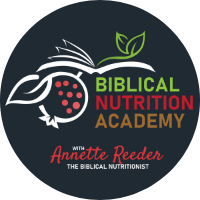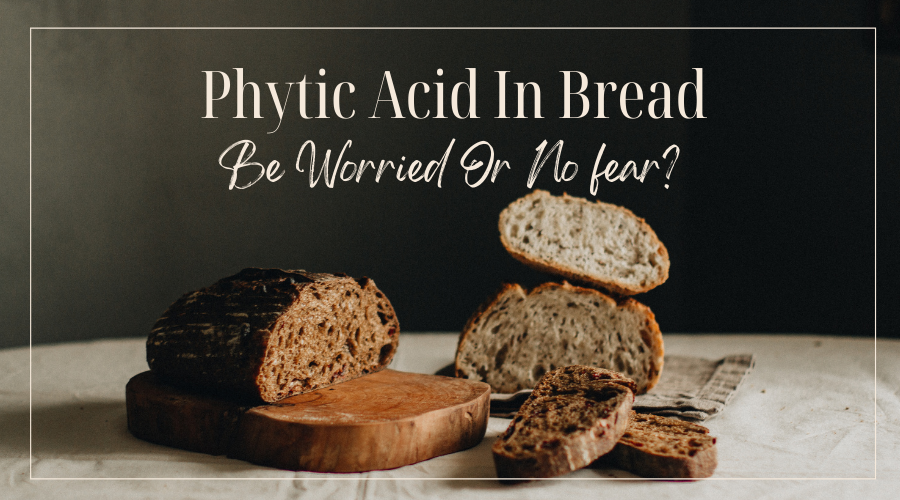
Phytic acid has gotten quite a bad rap over the years.
In fact, the myths that surround phytic acid would have the best of us avoiding bread and certain legumes like they’re the plague.
It’s no wonder too, when you hear things like:
Eating too much unfermented whole grains can lead to mineral deficiencies and bone loss.
Or long term consumption of untreated phytates can cause irritable bowel syndrome.
So is it true?
Should we only be eating grains that were soaked and fermented? Are whole grains really that bad for us – despite the numerous health properties that suggest otherwise?
Today, with insights and research provided by our friend Sue Becker over at The Bread Beckers, we are going to dive deep into the truth about phytic acid.
You’ll also discover life-giving provisions God supplied for your health and protection in this controversial substance, and settle once and for all the sprouted bread question.
Let’s get started!
What is Phytic Acid?
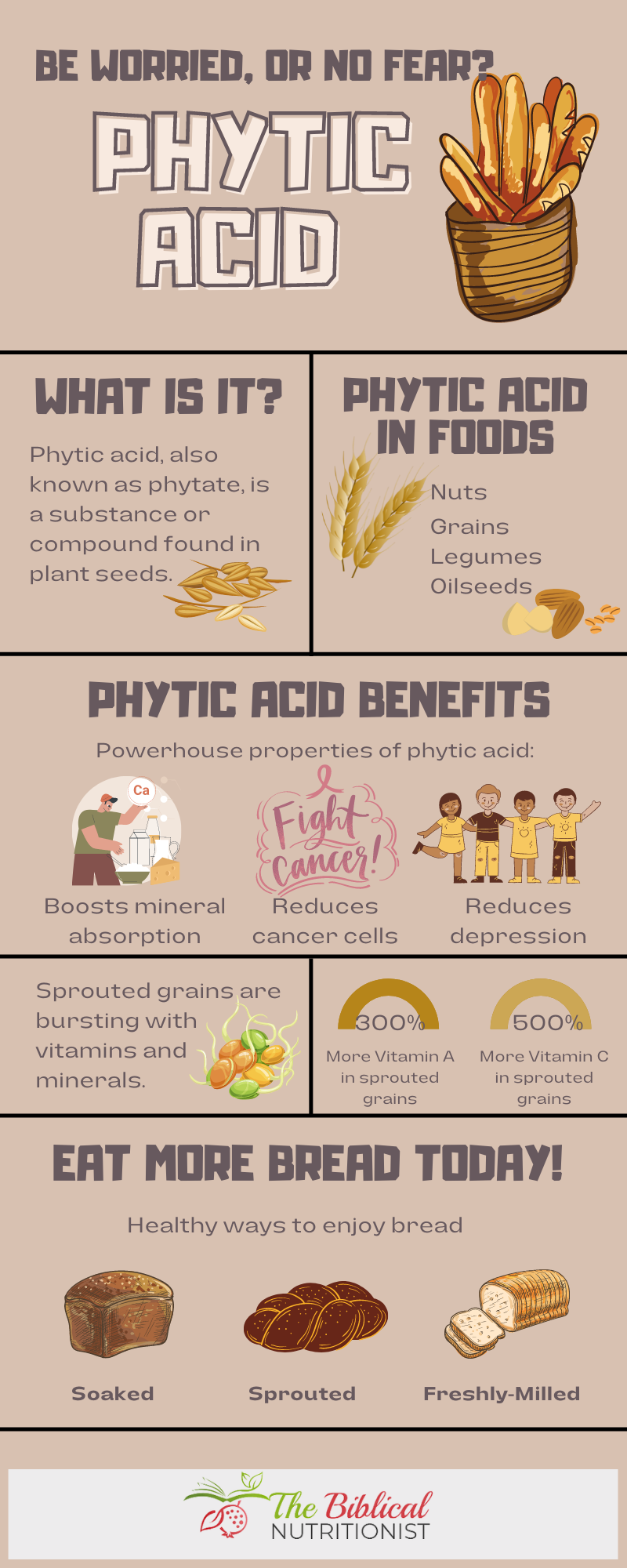
For those who don’t know, phytic acid, also known as phytate, is a substance or compound found in plant seeds.
Some examples of phytic acid foods are:
nuts
grains
legumes
oilseeds.
A powerful antioxidant, phytic acid has a unique “chelating” ability which is often maligned… thus earning it’s less-than stellar classification as an anti-nutrient.
But, there are many researchers that consider phytic acid’s ability to bind with minerals (chelation) as its most powerful asset.
Yet others assert that we can’t even digest phytic acid, making it even less a desirable substance to have in our food.
So which is it? And do we need to worry about it?
Let’s prayerfully look at the findings and then you can decide for yourself if phytic acid is as harmful as some claim it to be.
Is Phytic Acid Digestible?
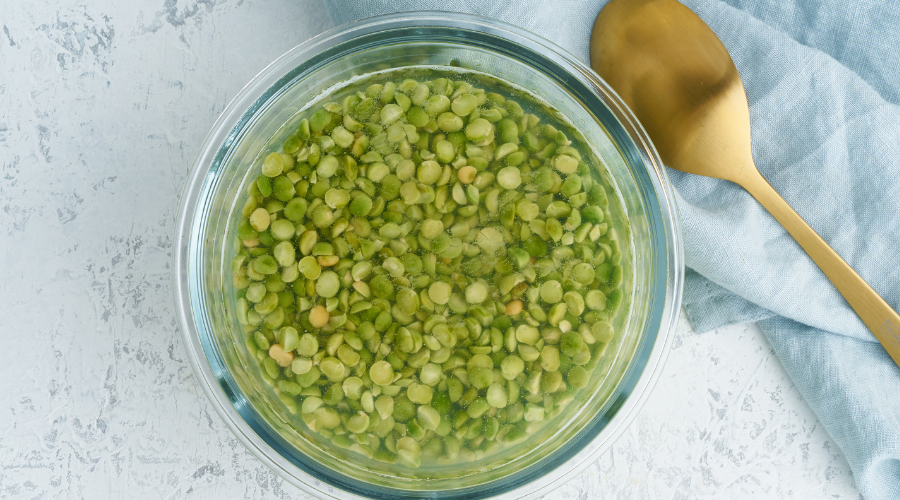
You may have heard that human beings can’t digest phytic acid because “we don’t produce the enzyme phytase.”
Because of this misconception, many people believe that the only way we can or should eat grains is to soak, sprout, and ferment them, since this process supposedly breaks down the phytic acid in the bran portion of the grain.
They try to back this up with Scripture too, referencing Ezekiel 4:9 as proof that “our ancestors and virtually all pre-industrialized people only ate grains that were soaked or fermented.” Sally Fallon in Nourishing Tradition, pg. 452.
We’ll dissect what God was actually instructing Ezekiel in a moment but first — let’s look at what the studies say.
It would surprise a lot of people, but studies show that phytic acid, particularly from wheat bran, actually stimulates the production of phytase in the small intestine. The very enzyme needed to break it down.
So, the answer to the question ‘is phytic acid digestible by humans’ is yes. We can actually digest phytic acid!
But what about that “chelating” concept, you might be wondering? Isn’t phytic acid an antinutrient that blocks our bodies from absorbing certain key minerals and doesn’t that make it bad for us?
Is Phytic Acid Bad For You?
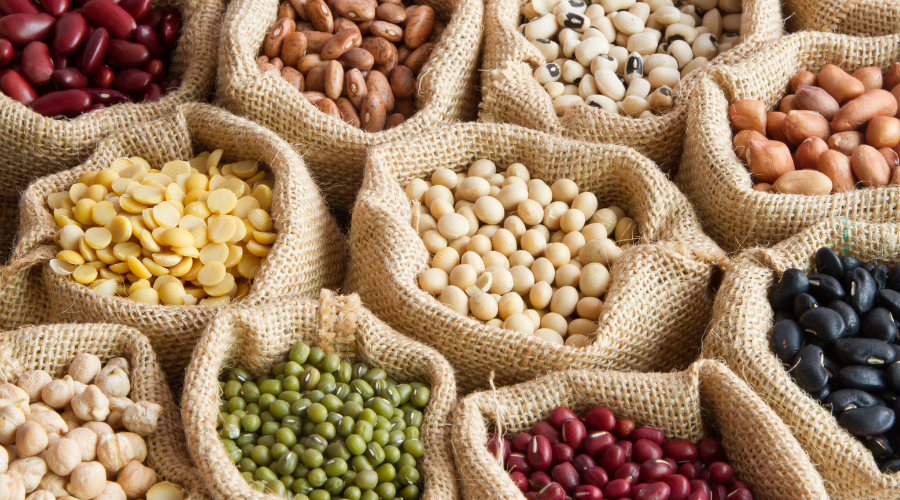
“Untreated” phytic acid, they say, will combine with calcium, magnesium, copper, iron, and zinc, and block their absorption.
But is that the full story?
Some of the most fascinating research tells us something else entirely!
In her book, Diet for the Atomic Age, author Sara Shannon asserts that it is actually due to its unique mineral binding properties that phytic acid can protect against heavy metal toxicity and radiation damage.
How?
With its powerful mineral binding ability, phytates bind with radioactive and toxic substances, actually carrying them out of the body.
BIBLICAL NUTRITION ACADEMY
Learn God's Recipe for Health Spiritually & Physically TODAY! NUTRITION FROM THE BIBLICAL PERSPECTIVE - eating, praying and fasting courses just for you.
In fact, the more toxic our environment becomes, the more beneficial grains are to us, particularly due to the phytate content.
It sounds to me like God knew exactly what He was doing when He said:
“Behold, I have given you every herb bearing seed, which is upon the face of all the earth, and every tree, in the which is the fruit of a tree yielding seed; to you it shall be for meat.” (Genesis 1:29)
Could it be that we’ve been wrong about this supposed “antinutrient” all along?
A Powerhouse Of Properties - Phytic Acid Benefits
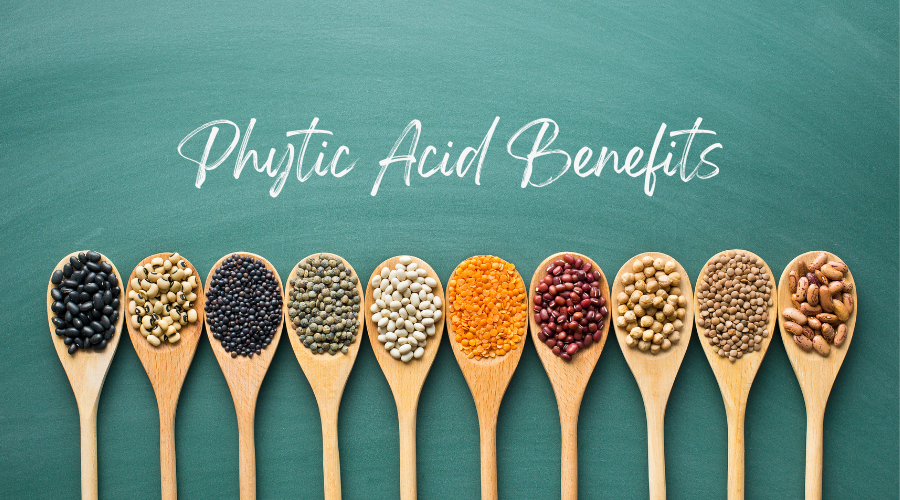
After reading about these phytic acid benefits, you might want to consider increasing your phytic acid foods!
So what powerhouse properties does phytic acid have? It’s more amazing than you think:
Phytase activity in the small intestine increases the absorption of minerals, especially calcium. (Journal of Nutrition 2000:130: 2020-2025).
An increase of phytase activity, stimulated by phytic acid, offers significant reduction in the formation of cancer cells in the colon.
In the process of digestion, phytic acid releases inositol, a key B vitamin necessary for the metabolism of fat and cholesterol; inositol also boosts energy and helps reduce depression.
Now we see why there’s at least one supplement company in the process of isolating this “powerful antioxidant” due to its anti-tumor, anti-carcinogenic, and blood sugar regulating properties!
We also see why author Sara Shannon believes that “for optimal health, at least half of every meal should be grains.”
So why the hate on whole grains? And why are we trying to reduce phytic acid in our food intake by sprouting and fermenting grains if it has such an incredible effect on the body?
The Truth About Whole Grains
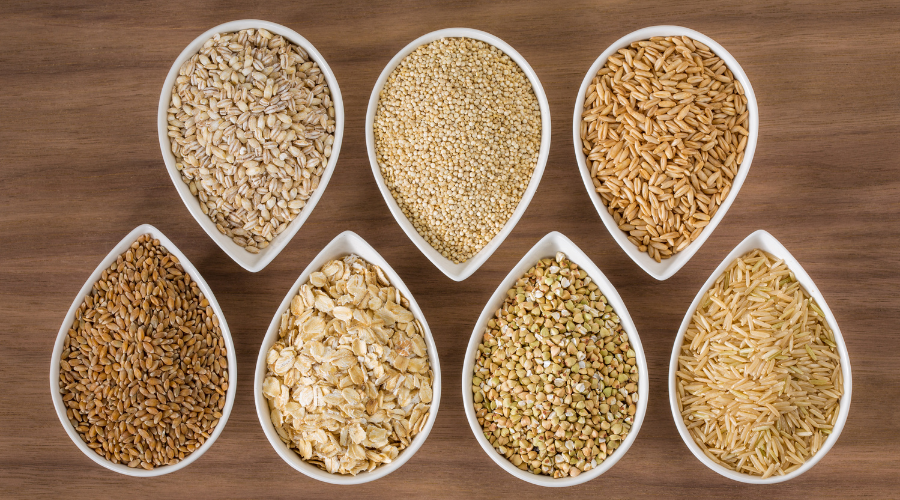
The truth is that whole grains are an abundant source of iron, calcium, and zinc.
When we consume whole grains, we are supplying our bodies with necessary nutrients, which we absorb through the production of phytase in our small intestines, stimulated by phytic acid.
Whole grains are a valuable source of inositol as well, along with choline and lecithin, which are important in the breakdown of cholesterol.
From lifelong anemia issues healed to colitis and IBS improved, consuming whole grains and preparing them as God designed them to be has changed the lives of so many people.
And no, the preparation I’m talking about isn’t sprouting, fermenting, or soaking grains.
The process I’m referring to is the process of grinding whole grains yourself and making “real bread.”
"Real Bread" - God's Life-Giving Provision
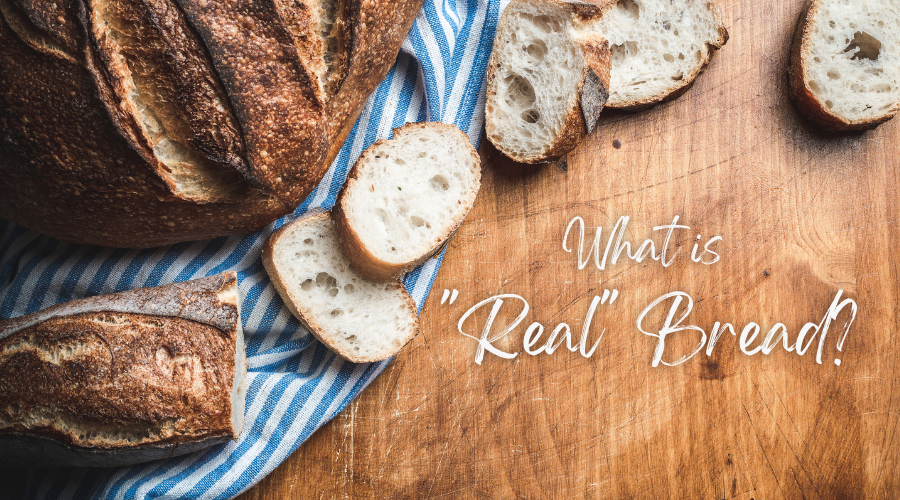
It’s no secret that grocery stores today are filled with denatured and processed grain products.
In fact, bread is one of the most altered foods out there. No matter how “healthy” or “whole” it claims to be, the bread you’ll find at the grocery store is a far cry from the pure, safe, and nutritious bread God intended us to eat.
The only way to ensure we are getting the health benefits and life-giving effects of freshly milled bread is to make it ourselves.
In fact, Sue recommends getting your hands on a grain mill so that you can begin learning how to grind your own grains.
After all, organic whole grains are not genetically modified. If you have a trusted source for where you get your grain, it’s practically a perfect food – rich in nutrients, minerals, and other health-supporting properties. (Check out this list of the best places to buy whole grains in bulk.)
Is it any wonder then that Jesus referred to Himself as the “Bread of Life”? (John 6:35) Bread was always meant to be life-giving! Not feared or reviled as so many people treat it today.
Which brings us to the question of sprouted bread.
Is it everything it's purported to be? Did our ancestors only eat soaked and fermented grains like some claim? And does that mean we should too?
Phytic Acid In Soaked And Fermented Grains
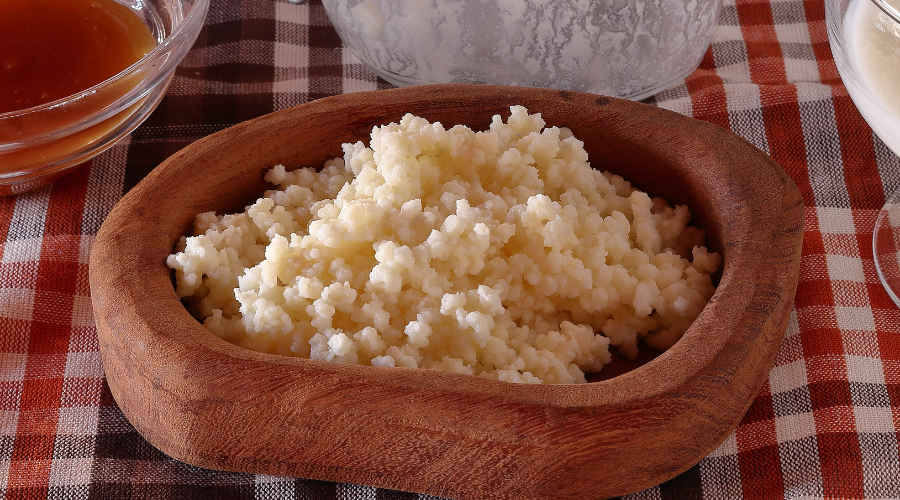
As previously mentioned, there are many people who believe that our ancestors and all pre-industrialized people only ate grains that had been soaked and fermented.
They use Ezekiel 4:9 as “proof” that since Bible times, people have been soaking and sprouting their grains.
While ancient cultures did indeed eat fermented food, including bread, nothing suggests historically that this was the only way they consumed their grains.
In fact, fermenting grains had more to do with preservation. Many foods were fermented in order to preserve them longer. Grains were no exception.
They would also ferment their grains in order to add:
texture
flavor
and aroma.
God's Recipe For Phytic Acid Rich Bread
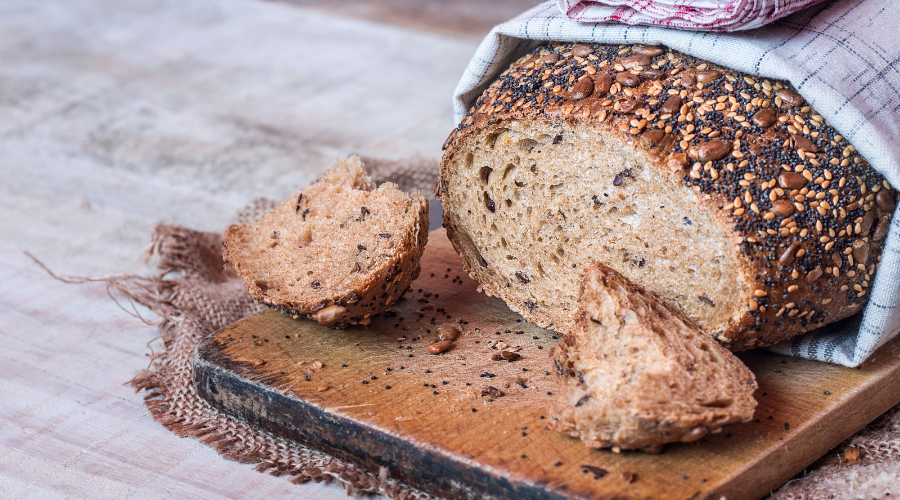
The misunderstanding surrounding phytic acid has led many to elevate sprouted bread and beans as the healthier “solution” offered and supported by God’s Word, with Ezekiel 4:9 cited as “the first place where sprouted bread is mentioned.”
But if you carefully examine the verse, you’ll find that nowhere does it indicate that the grains are sprouted:
“Take thou also unto thee wheat, and barley, and beans, and lentils, and millet, and fitches, and put them in one vessel, and make thee bread thereof…”
Here, God simply instructed Ezekiel to take all these different grains and legumes and put them into “one vessel,” or, a single container.
It doesn’t mention soaking or sprouting!
God wanted Ezekiel to make one bread out of the grains and beans combined.
This would have resulted in a bread chock full of protein, phytic acid, and other nutrients — enough to sustain Ezekiel over the length of his fast.
In fact, had Ezekiel sprouted the grains and beans first, the bread would have actually had less protein, which wouldn’t have been ideal as he was about to embark on a 400 day fast!
So, where does this leave us?
If we know that there’s no reason to fear phytic acid foods…
And if we know that there’s no Biblical evidence that people only ate soaked, fermented grains…
Why sprouted bread? Well, let’s look at the health benefits and then you can decide for yourself if sprouted bread is the fit for you!Are Sprouted Grains Superior?
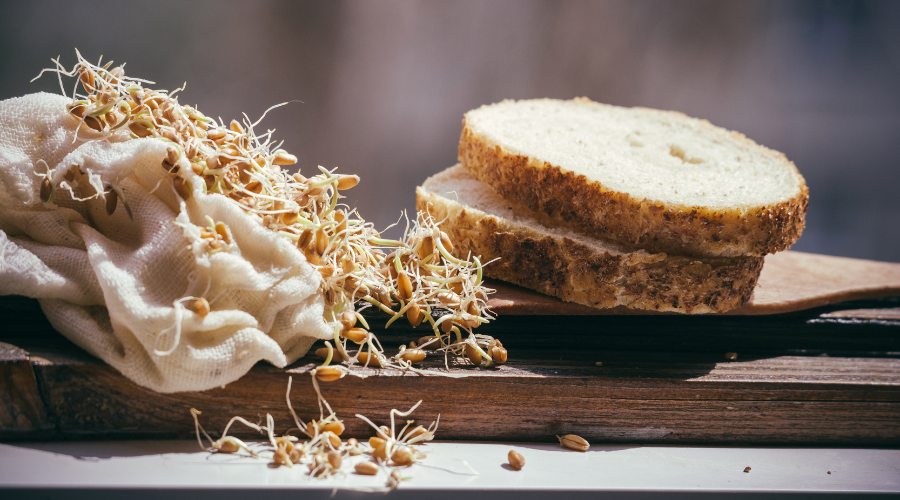
There’s no question that sprouted bread is a super nutritious food. And far be it from me to undermine its benefits!
Sprouted grains are bursting with vitamins and nutrients.
In fact, check out what happens when you sprout grains and beans:
Vitamin A content increases by 300%
Vitamin C content increases by an amazing 500%
With stats like that, it’s no wonder that sprouted grains and beans are so popular!
Another benefit to sprouted bread is that it can be more easily tolerated by people with a gluten-sensitivity.
But should it take the place of whole grains? And is it somehow superior to whole, organic grains and non-sprouted beans?
Nothing in the Word suggests it. And if we set aside the trumped up fears about phytic acid, then nothing in the nutrition world should either.
In fact, the whole reason why health and wellness writers today decry the benefits of consuming whole grains in favor of sprouted, soaked, and fermented grain is because they say if you soak your grains, you can denature or reduce phytic acid in the grain.
But do you know how much phytic acid is broken down in an overnight soak?
A mere 10%. This is nowhere near enough to make a significant difference. And it pokes quite a large hole in the argument for soaked or fermented grains somehow being superior for us.
Making Food Choices Without Fear
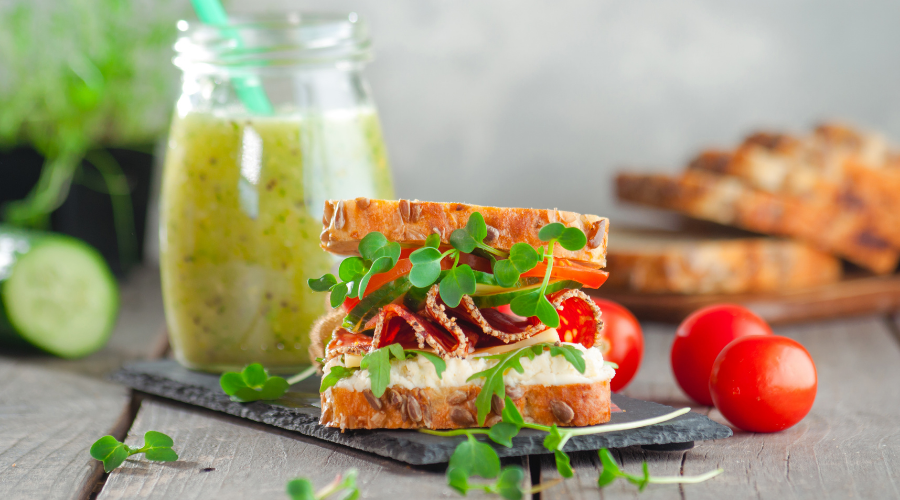
So what have we learned so far? And how does what we learned set us free us to make food choices without fear?
Well, we now know that there’s no reason to fear phytic acid foods. Phytic acid has unique benefits and our small intestines can produce the phytase enzyme needed to digest it.
Whole grains are not bad. Far from it, in fact. “Real” bread has amazing healing properties, vital to our health.
There’s no evidence ancient peoples only ate fermented, soaked grains, and that includes in Scripture.
Sprouted bread has amazing nutritional benefits – and may be preferable for those with gluten issues – but that doesn’t mean it's superior to whole grain bread.
Once you embrace the reality that God provided all you needed for your continued health and wellness in foods like whole grains, beans, and seeds, you won’t fall prey to sneaky little deceptions that cheat you out of the Lord’s best for you!
In fact, knowing the truth about phytic acid allows you to enjoy the food God made without any fear that that food is somehow going to harm you.
Do we need to be wise about where we get our food and how processed it is? Yes. Man has taken God’s perfect provision and put his own spin on it, denaturing, processing, and modifying it, much to our detriment.
But that doesn’t mean we need to fear or be worried. It just means we pay attention to our food sources and that we focus on getting whole foods, as organic and unprocessed as possible.
It also means taking advantage of life-giving practices like investing in a grain mill and making bread from scratch. Only then can we appreciate the true health and healing benefits that come from eating freshly milled whole grains.Free To Enjoy Bread As God's Gift
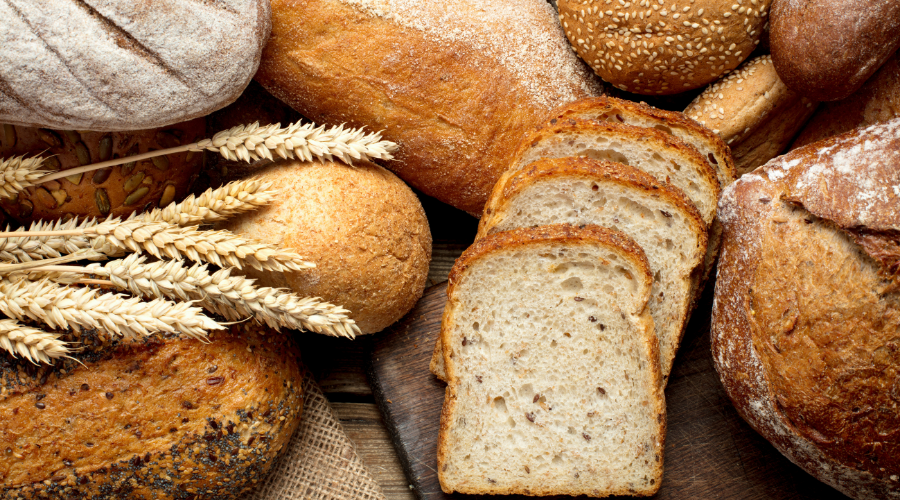
The truth is, you can embrace both whole grain bread and sprouted bread as two wonderful options that God has made available to you for your continued health and wellness.
Bread – whether it’s soaked and sprouted or freshly milled – is a nourishing, life-giving food that God intended you to eat.
Why else would Scripture be full of references to bread, from God’s supernatural provision of manna in the wilderness (Exodus 16:32) to Jesus literally calling Himself the Bread of Life (John 6:48)?
Bread is even called the food of angels in Psalm 78:24-25:
“He rained down manna upon them to eat
And gave them food from heaven.
Man did eat the bread of angels;
He sent them food in abundance.”
I don’t know about you, but if God’s Word endorses bread as the food of angels, that’s good enough for me!
The Final Takeaway
If you take anything away from today’s article, dear reader, I hope it's that you don’t have to fear food or the way that God made it.
Bread – that is, real bread – can be amazingly healing, nutritious, and life-giving. In fact, it can serve as a powerful reminder of our Lord and Savior, who gave Himself for us and to us.
He is our true healer, our true source and Giver of Life. We do not live by bread alone; instead we live by every word that proceeds out of the mouth of God.
Even so, let us live, Lord!
A special thanks to Sue Becker over at The Bread Beckers for her wonderfully researched article Phytic Acid - Friend or Foe? We give her credit for the information and research found in today’s blog post.



